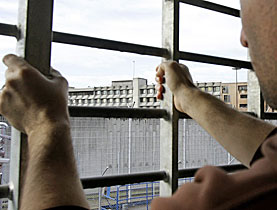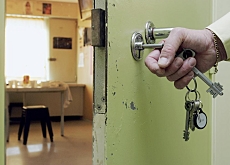Switzerland slow to return foreign prisoners

Switzerland has made a slow start in introducing European measures that would ease the number of foreign nationals in its prisons.
Just three convicted criminals have been repatriated to serve out penal sentences in their countries of origin since a Council of Europe protocol was adopted by Switzerland in 2004.
The protocol, an addition to the 1983 European Council Convention on the Transfer of Sentenced Persons, legally enables states to send people to their countries of origin to serve sentences over six months – without their consent.
The convention aims to improve offenders’ reintegration into society by returning them to familiar territory after they leave jail. Its newer protocol attempts to deal with those people who commit a crime abroad and become subject to an expulsion or deportation order from the sentencing country.
The protocol became law as soon as it was ratified by Switzerland. But the justice ministry says it has been hard to enforce.
Folco Galli of the ministry blamed a lack of coordination between the Swiss migration and penal authorities. He said the poor human rights records of some of the recipient countries also meant criminals could not always be sent back.
The process has further limitations because a number of countries have not ratified the convention – an important factor as the compulsory transfer of criminals requires the agreement of the recipient country, he told swissinfo.
“It’s because of these reasons that there are rather thin results which contrast slightly with certain very optimistic previsions given at the outset,” he told swissinfo.
Although no specific targets were set, the ministry had hoped the protocol would help “decongest” the number of foreign nationals in its jails in the long-term.
Since the beginning of the 1990s, around 70 per cent of the Swiss prison population has been foreign – compared with 28 per cent currently in neighbouring Germany and 22 per cent in France.
According to 2006 European statistics, Swiss prisons contained 5,888 inmates, of which 4,062 were foreign nationals.
Benefitting prisoners
A government working party has since been created to see how it can better apply the protocol in Switzerland and has come up with recommendations that will be sent to justice and police officials.
The working party’s main proposal was to improve coordination between the migration and penal authorities.
In the meantime, a law adopted by the government in January should start clearing up one grey area – the question of offenders’ residency status, Galli said. It has been a key issue for migration officials but the law now requires foreigners’ Swiss residency status to be reassessed if they are convicted of a crime.
The Council of Europe protocol states it will help in the eventual rehabilitation of a convicted person if they return to their country of origin to serve their jail term.
The protocol could benefit some prisoners, according to Alain Bovard, of the Swiss branch of Amnesty International.
“This is not only because this solution might increase the reinsertion possibilities of the concerned persons but also because it would allow them to receive more frequent visits from their families, to be in regular contact with people speaking their mother tongue and therefore enhance communication.”
“There is no sense in keeping someone here who in principle will have to leave Switzerland,” Galli confirmed.
“This protocol is inspired by the goal of better re-socialisation. If you are abroad it is difficult to prepare for re-socialisation if you’ve left prison and then have to return to your country of origin.”
swissinfo, Jessica Dacey
Swiss prisons housed 5,888 inmates as of 2006, of which 69 per cent were foreign nationals, according to Council of Europe figures. Those of foreign nationality included residents, tourists, asylum seekers and temporary visitors to Switzerland.
Tackling crime among foreigners will be one of the justice ministry’s goals for 2008-2011.
Justice Minister Eveline Widmer-Schlumpf said Switzerland did not need new laws to address the issue but had to strictly enforce existing legislation. The government aims to send a signal that “infractions would have a consequence on a foreigner’s residency status”, she said.
All member states have ratified the Council of Europe Convention on the Transfer of Sentenced Persons of March 21, 1983.
Under the convention, sentenced persons may be transferred to serve the remainder of their sentence only to their country of origin, and only with their consent and that of the states involved.
The 1997 Additional Protocol to the convention allows states to transfer a sentenced person without their consent and subject to certain conditions. It has not yet been adopted by all member states.
Under the terms of the protocol, a sentenced person must be granted a hearing before the courts, can still object to the transfer and can take their case to the Swiss Federal Supreme Court by lodging an appeal against extradition.

In compliance with the JTI standards
More: SWI swissinfo.ch certified by the Journalism Trust Initiative



You can find an overview of ongoing debates with our journalists here. Please join us!
If you want to start a conversation about a topic raised in this article or want to report factual errors, email us at english@swissinfo.ch.